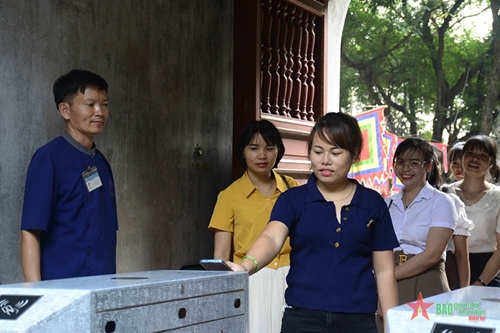In Vietnam, there have been commendable digital transformation initiatives in the sector. However, accelerating digital transformation to serve traveler needs remains a key concern.
Initial steps towards a smart tourism ecosystem
Instead of purchasing traditional entrance tickets, Ms. Nguyen Hong Ha just had to experience one touch and four steps to visit Van Mieu - Quoc Tu Giam in Hanoi. With the Vietnamese Travel Card, she could conveniently access various services within the historical site, such as digital tour guides, souvenir purchases, and parking. This online ticketing system is part of digital transformation efforts within the tourism sector, an initiative by the Cultural and Scientific Activity Center of Van Mieu - Quoc Tu Giam. This endeavor aims to create innovative and tech-savvy products to enhance the overall experience and attract visitors to Van Mieu - Quoc Tu Giam and the capital city as a whole.
    |
 |
|
Visitors experience digital tourism services at Van Mieu - Quoc Tu Giam. |
According to a report for the first nine months of 2023 by the Hanoi municipal Department of Tourism, digital transformation played a crucial role in assisting Hanoi's tourism sector to reach 18.9 million visitors, marking a 36.5 percent increase compared to the same period last year. This included 3.2 million international tourists, a fourfold increase, and 15.7 million domestic tourists, a 20.2 percent rise from the previous year. The total revenue from tourism reached an estimated value of VND 69.3 trillion, a 66.9 percent increase compared to that of the previous year. Notably, many other provinces and cities, such as Quang Ninh, Thua Thien Hue, Da Nang, Quang Nam, have also successfully initiated digital transformation activities.
New tourism resources
In a recent high-level forum themed “Digital transformation in tourism development” in Ho Chi Minh City, Deputy Prime Minister Tran Hong Ha stressed the need for the tourism sector to develop new spaces, infrastructure, resources, and more effective methods of implementation. Digital transformation, he stated, is the key to solving these challenges by creating digital spaces, digital infrastructure (more cost-effective and faster than physical infrastructure), data, and trends that enhance competitiveness and efficiency in the tourism sector's growth. In the long run, a hyper-connected world will blur geographical boundaries and integrate nature into our lives, generating new resources and effective management methods for tourism development.
According to experts, when the tourism sector vigorously embraces digital transformation and establishes a smart tourism ecosystem, it supports State management, tourism service businesses, and enhances the traveler experience, saving time for tourists. However, the digital transformation process in Vietnam's tourism sector faces various barriers and limitations, including fragmentation and challenges that hinder the development of a unified and coherent ecosystem across the sector. Disparities in digital technology exist across regions due to differences in technological development levels, as well as shortages in modern technology, financial resources, and digital skills.
The Vietnam Museum of Fine Arts is one of the successful examples in digital transformation, promoting its image and showcasing its art works. Recently, the museum launched the Virtual Art Exhibition Space (VAES), a digital platform that allows artists to present, promote, preserve their artworks while facilitating connections and interactions, creating opportunities for art enthusiasts, collectors, and both local and international audiences.
According to Mr. Nguyen Anh Minh, Director of the Vietnam Museum of Fine Arts, information technology applications have significantly improved the quality of the visitor experience, the preservation, and promotion of cultural and artistic heritage. The first digital transformation breakthrough for the museum was the implementation of the iMuseum, a smart museum application in April 2021. Within three months, the museum welcomed over 80,000 online visitors, exceeding the annual visitor count before the COVID-19 pandemic. In practice, the visitor number has continued to grow each year. However, to achieve this success, the museum had to overcome numerous challenges, from financial and human resources to administrative procedures and policies. Therefore, the digital transformation journey in tourism requires determined efforts and innovation, both in mindset and sector-wide action, involving regulatory agencies, businesses, organizations, and local governments.
“Digital transformation is a must for the survival of tourism sector in the wake of the severe impacts of the COVID-19 pandemic worldwide. In recent times, the tourism sector has initiated several digital transformation solutions such as the Vietnamese Travel Card, the ‘Vietnam Travel’ national tourism application, tourism management and business systems, online ticketing systems, and multimedia presentations. These national digital platforms are the foundation for the creation of a unified and coherent smart tourism ecosystem nationwide,” said Director General of the National Tourism Administration of Vietnam, Ministry of Culture, Sports, and Tourism Nguyen Trung Khanh.
Translated by Trung Thanh